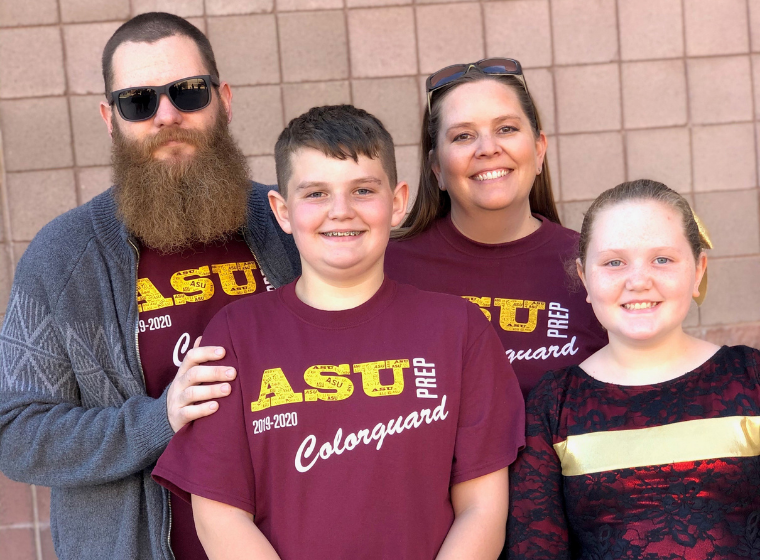There are many ways to give including donating money, dining at certain delicious restaurants, stock volunteering, and more. But there’s a new option at SARRC thanks to Joe Bradley and his family.
Joe and his wife, Heather, are fierce advocates for their 14-year-old son, Cooper, who was diagnosed with autism at age 5.
As an artist and creative professional, Joe created a project called DoublePops to raise funds for research and support while demonstrating how autism affects people differently. The family reached out to SARRC about the project and asked if SARRC would accept cryptocurrency.
Digital currency can be used to buy and sell items online. For DoublePops, this includes one-of-a-kind digital art known as “DoublePops” and non-fungible tokens. These non-fungible tokens, also known as NFTs, are digital assets that represent art and other real-world objects. Sold online, NFTs range from inexpensive to millions of dollars with ownership and exclusivity guaranteed in the digital world.
Joe received his own diagnosis five years ago, and their mission now is to raise awareness to neurodiversity—and they’re doing just that. Joe’s Twitter and Instagram accounts, dedicated to DoublePops, have gained traction among art and NFT enthusiasts.
Joe says he chose the DoublePops theme after a recommendation from a friend that they served as a great way to explain differences amongst people when discussing neurodiversity. His NFTs range from simple double-stick frozen treats in various colors to fanciful images donated by world-famous artists eager to support Autism awareness and research. He describes the original versions as “nostalgic pixel art, reminiscent of early video-game art but with unique themes and vivid colors.”
The most important lesson Joe and Heather say they learned about autism is that it is different in every individual and it’s not something you can judge by meeting someone.
“Unlike the stereotypes portrayed in the media, autistic people don't all have a special interest or engage in outward repetitive behaviors,” Joe says. “The DoublePops series reflects this. Each DoublePop is different but is part of a whole—just like people, who can be neurotypical or neurodiverse, but are all part of the same human family.”
Only 100 of the DoublePops collectibles will be created with a portion of proceeds going to autism research and support organizations. This is the first NFT art project dedicated to bringing  awareness to neurodiversity, according to Joe.
awareness to neurodiversity, according to Joe.
Their goal, the Bradleys say, is to help autistic adults and parents of autistic children navigate the complexities of a world not always geared to their strengths and challenges.
It’s also a learning opportunity for their own children.
“The project is an innovative opportunity for Cooper and Olivia, his sister, to learn how to run a business,” says Joe.
The DoublePops fundraiser began this summer and continues with the final interpretations donated by some of the hottest artists in the physical art world and NFT space.
Guest artists taking part in Phase 1 are Ali Sabet, Andy Poon, Brian Morris, Brian Romero, Cake Nygard, Christine Webb, Cory Pawlak (End-One), Eduardo Herrera (Hood Vangogh), Eva Crawford, Frank Kozik, Jason Spencer (Killer Napkins), Jennifer Moyer (Plotski), Kate Samuels, Kyle Confehr, Klim (Big Shot Toy Works), Matan Salmon (Fiiidgt), Matt French, MUMBOT, Nate Bear, Russ Morland (LURK), Sean Keeton, Shaun Cheney (Meanmugg) and Violetta Melnikova, Sam Pierson, Allison Bamcat, Jason Ostro, Jess West, Mariana Martins, Matthew Foglia, Mitch Putnam, Mobsolete, Ngaew, Olivia Grey Smith, Smiletime Studio, Oli Kentner and more.
But the Bradley family’s work won’t stop there. DoublePops Phase 2 will begin once the 100 NFTs have been claimed. It involves developing an online marketplace offering real-world items such as art prints, home goods, DoublePops apparel and collectible toys.
Offered for sale in Ethereum cryptocurrency, the artwork can be seen here on the OpenSea.io marketplace.
If you are inspired to give back, check out the many ways to support SARRC, including donating cryptocurrency, at autismcenter.org/giving.

